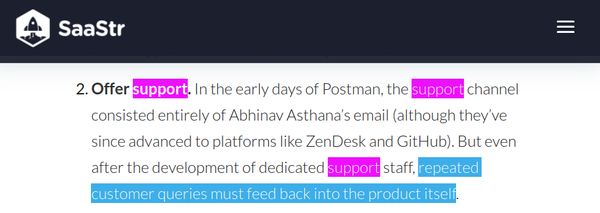I keep notes here. Most of these are related to travel, work, or books.
Six SaaSter Podcast Episodes That Were Pretty Good
ManagementSaaSter is a business heavy podcast. As tech podcasts go it is barely tech. It is about growing a company, fostering company culture, hiring salespeople, running customer support: this is solidly about "Business". The companies are all software companies, so, even if you are not a business expert, the conversations are interesting. I can vouch for the episodes where they profiled these companies:
1. Postman #
Founder Abhinav Asthana
This is SaaSter Podcast Episode 528
Postman is an exciting product to use, I think. I was amazed at how big this company is though. It's not a little tool, it's more like Cloudflare, like it is building the whole internet. The company is very large already. According to Owler:
Est. Annual Revenue #
$25-100M
Est. Employees #
250-500
Funding #
$433M
This episode says the Postman valuation as $5 billion.
I would give this episode 3/5 stars.
I liked Abhinav's point about "repeated customer queries must feed back into the product itself".

2. Terminus #
Founder Tim Kopp
This is Saaster Podcast Episode 431, February 26, 2021
Terminus is a shipping app.
I would give this episode 4/5 stars. The product is boring but the business aspect is good. The speaker is a bit testosteroney but is an effective communicator and a reasonably skilled rhetoritician.
Quoting Amelia Ibarra quoting Tim Kopp here, from this episode:
To maximize growth, you must dedicate your efforts to net retention. Retention is the new acquisition. To deploy the most effective strategy, Tim recommends the following tips:
Use an ABM framework to target your high-value customer accounts.
Engage your customers via a multi-channel strategy.
Leverage Customer Success to get the data you need to run the right plays.
Measure NDS/Satisfaction scores, usage rates, and expansion opportunities.
3. Gitlab #
Sid Sijbrandij co-founder of Gitlab
GitLab was invented in 2011 in Ukraine and was incorporated in 2016.
A User Community is hard to build.
And easy to lose.
An active community iterates the product more quickly. It creates champions. "We try to avoid the term 'community manager'.
We have a dual flywheel strategy."
Their Source Available opensource monetary model is similar to those of Confluent and Hashicorp.
We tried consultancy. We tried donations but they topped out at $1000 a month. Not enough.
We tried paid support but we saw customers cancelling after one year, because our product is easy to run.
Monetizations that didn't work:
We tried pricing by stage.
We tried pricing by company size.
We tried pricing by maturity of company.
We finally settled on executive vs single devs. We call it a "buyer based open core model".
With an eye toward future growth of gitlab use, we invest in programsm that will grow our wider adoption. We give our product for free to education institutions, open source orgs, and qualifying startups.
First time contributing is intimidating on a large project. To enable more people to contribute, Gitlab hires Merge Request Coaches (from its existing employees). They triage issues and then mentor new contributors.
We host regular hackathons. I was skeptical of these at first. Our most succesful Hackathon resulted in 390 merge requests.
Gitlabs KPIs for their user community #
We use Key Performance Indicators to monitor our user community. This community is hard to grow and easy to lose. Some of the indicators we use:
- the number of individuals from the wider community making contributions to Gitlab
- Total number of contributions from the wider community that we merge into the code base each month
- MraR contribution activity from the largest customer based on how much they invest with us
Gitlab is radically transparent. Gitlabs Company Employee Handbook is public: "The GitLab team handbook is the central repository for how we run the company. Printed, it consists of over 2,000 pages of text . As part of our value of being transparent the handbook is open to the world, and we welcome feedback."
4. Flock Safety #
This is Saaster Podcast Episode 434 Published on July 20, 2021
If I remember this episode correctly, he explains how to hire explosively. I think Terminus went from 5 salesman to 95 salesman in the space of a year. He explains how they did it.
5. ProfitWell #
I don't remember many details but I remember I liked this episode. He discussed the salvage offers tactic, when a customer fails to renew with your SaaS.
From the show's description:
In this episode, ProfitWell Founder & CEO Patrick Campbell shares benchmarks from over 23,000 companies and offers a helpful framework to re-evaluate your retention strategy and increase your CLV (Customer Lifetime Value) between 10 and 60%.
4/5 stars.
Further Episodes to check out #
-
Working with your developers Twilio
-
Episode 509 Freshworks, Twilio, 1Password, Coda (Podcast 509 and Video)
-
Building a great internship program at Shopify
MORE #
- Next: My Matomo Instances
- Previous: In Matomo How Do I Track...